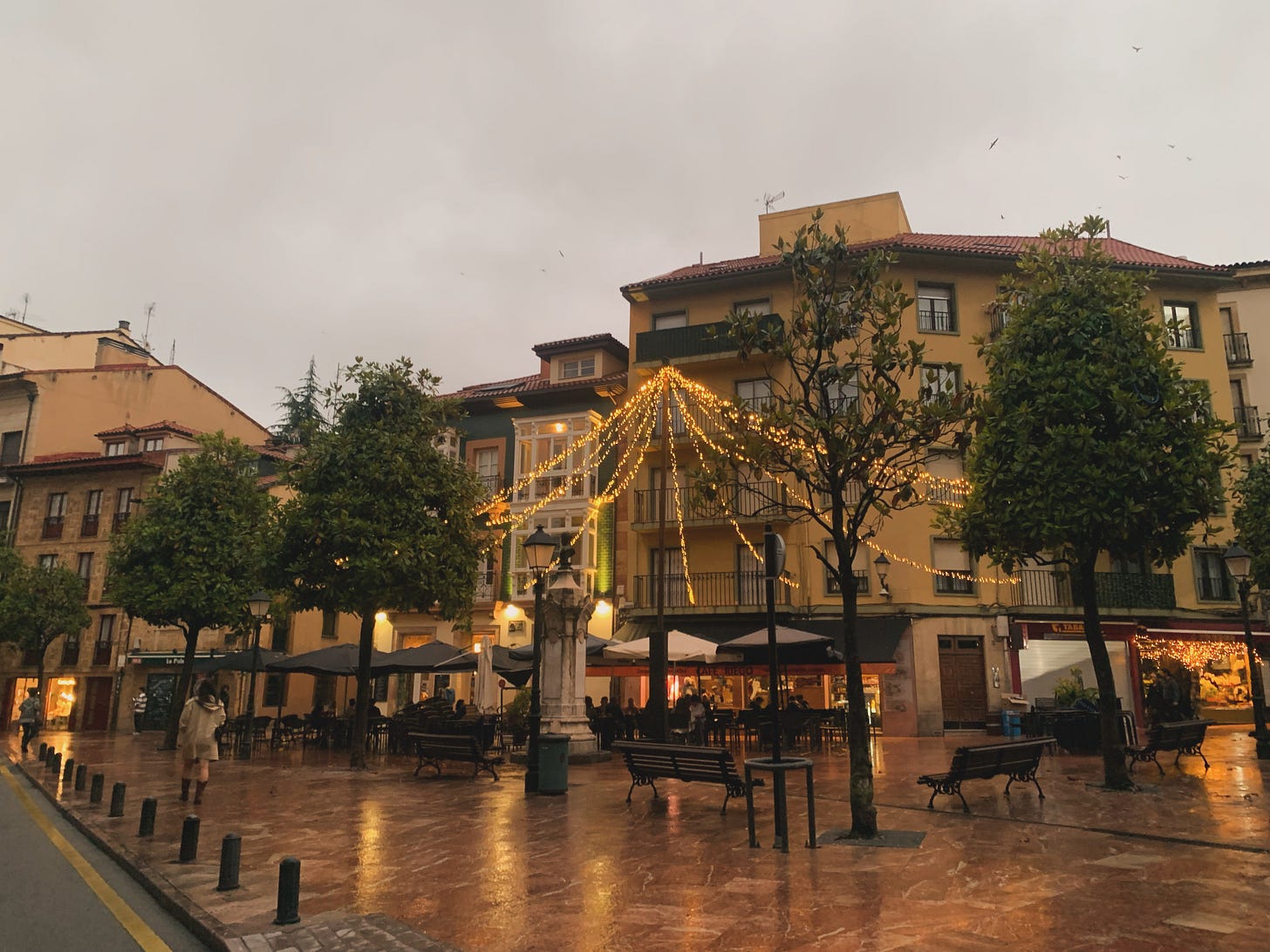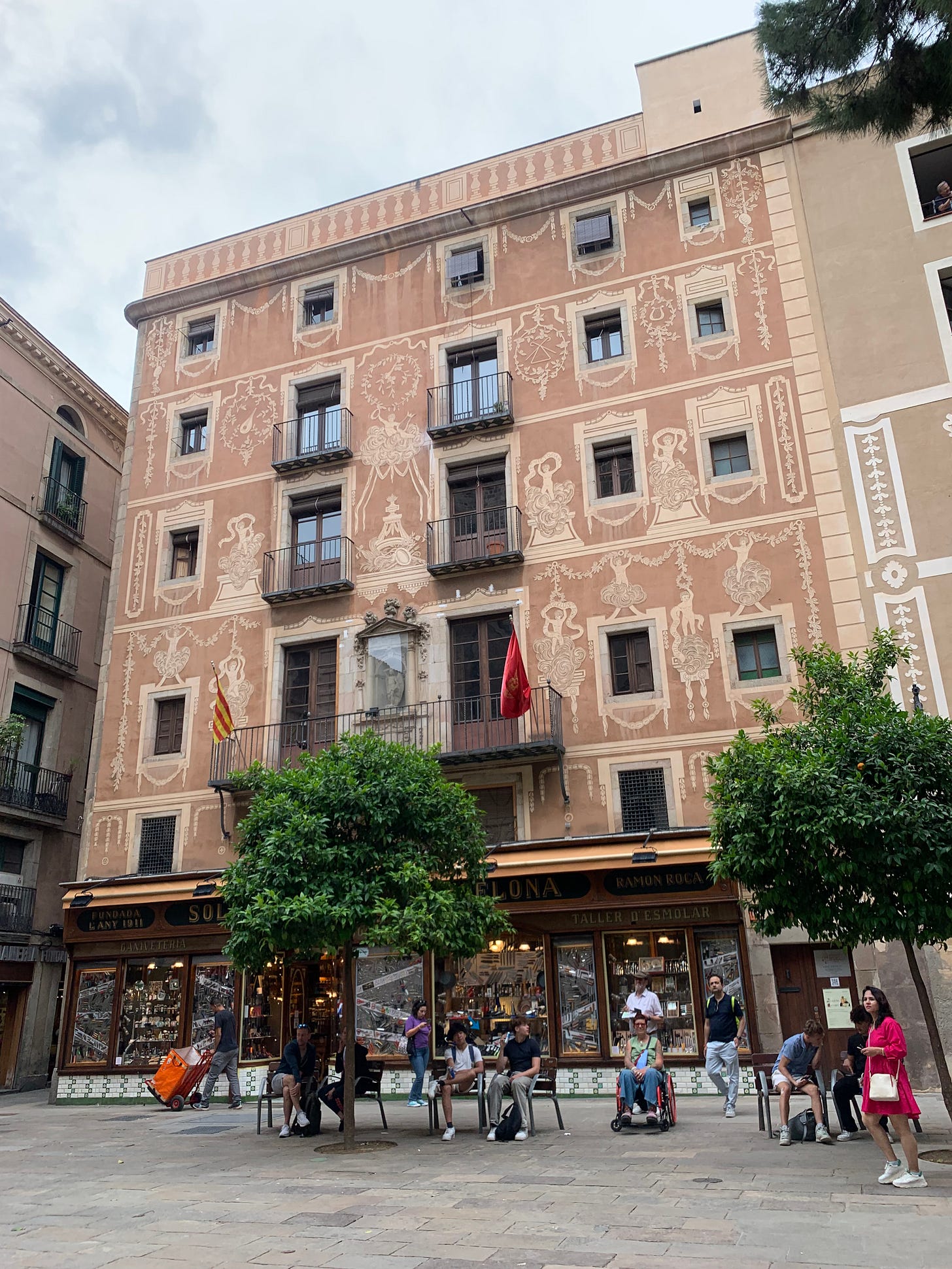Today is Friday, my favourite day. For most, the responsibilities and stresses of the week are over and today, one day after summer solstice, the weekend stands before us to be unfurled and with, as J.P. Donleavy wrote in The Ginger Man, the possibility of all things to be born like uncovered stars.
There is a cerulean sky above us in Baltimore today, and the cats are lounging around the apartment. The collar of my beloved Max sits next to me as I write these words. A week ago, I returned from a few days in Europe, where I was privileged to enjoy the warm hospitality of some of my friends who invited me to visit with them in London, Madrid and Barcelona. It was the first time I had crossed the Atlantic since a visit to Greece and London in September 2022 and only the second time I had been out of the United States since my diagnosis last year (in February, I took a reporting trip to Jamaica and Haiti, as you may recall). It was an incredibly restorative experience to see so many friendly faces again, especially coming from Baltimore, where I remain rather disconnected from many of the places where I have a multitude of people - you know who you are and where you are - who I have grown close to over the years. Being back in the groove of my tribe again, so to speak, reminded me of a passage that James Baldwin wrote in his novel Giovanni's Room about how “Not many people have ever died of love. But multitudes have perished, and are perishing every hour--and in the oddest places!--for the lack of it.” How lucky I have been on that score.
During this trip, I saw for the first time the region of Asturias in northwest Spain, whose steady rain gives it an emerald green and mist-shrouded appearance that has something of a Celtic atmosphere about it and which reminded me, above all places, a bit of Ireland, an utterly different feeling than anywhere else I have visited in the country. I traipsed around the beautiful provincial capital, Oviedo, under a steady drizzle, drinking coffee and enjoying the local revivifying fabada stew (perfect for such a climate), and then took the very cheap and very fast train to the seaside city of Gijón, which had a bit more grit and verve and where I wandered a warren of alleys near the ocean and took in its bracing seaside malecón facing out towards the Bay of Biscay.
My social media “memories” reminded me that I was in Oveido on the sixth year anniversary of the death of the American chef, author, and travel documentarian Anthony Bourdain, who took his own life in a motel room in Kaysersberg Vignoble in northeastern France in 2018. The one tangential connection I have to Bourdain - the Spanish chef and humanitarian José Andrés, who I know very slightly thanks to his work in Puerto Rico and Haiti and who is himself a native of Asturias - made me think, as I looked out upon the fog-dappled streets from a local café, of the nature of travel, of how we enter and depart from peoples’ lives as we engage in it and how it expands and deepens our knowledge of and appreciation for the beauty and struggle - the beautiful struggle - of the world. At one of the absolutely lowest ebbs of my life, Bourdain's show - which I was able to stream for free and probably illegally online - was one of my few rays of hope for months and months, reminding me of the great adventure that life could be. Probably more than anyone on U.S. television, he taught Americans, who can often be so insular, that the world was a wondrous place they should be enthralled by instead of afraid of. As a foreign correspondent, I found his work in Gaza - where he visited a besieged people and showed the world that Palestinians are human beings with hopes and dreams - especially impactful. And somehow on that melancholy anniversary, I felt some trace of him hovering around the Plaza de la Escandalera.
I then headed to Madrid by bus, a bus which stopped for 20 minutes at what must be the world’s most forlorn gas station, on a moonscape of a plateau with few signs of life around it, before arriving in the Spanish capital on a warm late Sunday afternoon, there to stroll the Plaza de Olavide in Chamberí, green around its fountain and full of people laughing, talking and flirting and…Life, just life, which was so nice to see and which was, for me, someone on a limited budget to put in generously, was still easily available there. It reminded me of an essay I translated last year by the late Spanish writer Almudena Grandes on the sublime, simple joys of summer, where she wrote
There are many good things that come very cheap. A bottle of wine to drink slowly, at home, at sunset and with friends. A good paperback, providing an emotion that lasts longer than wine and costs about as much. A summer cinema, the ideal place to hold hands. A portion of Russian salad and two beers, on the terrace of any bar, before or after the summer cinema. Falling in love is an even cheaper miracle, though so expensive that it cannot be manufactured.
The following day my friend Fernando, a journalist at El País, and I wandered around the once-bohemian and now rapidly-gentrifying neighorhood of Lavapiés, pausing for a coffee at the Café Pavón, before going to the Museo Nacional Centro de Arte Reina Sofía, where, for the first time, I saw Pablo Picasso’s 1937 painting Guernica in person. Despite having seen the painting in books and online many times, one is still not prepared for the intense emotional impact of seeing it up close. Inspired, if that is the right word, by the April 1937 bombing of the village of Guernica during the Spanish Civil War by warplanes of Nazi Germany’s Condor Legion - fighting on behalf of the great fiend, General Francisco Franco - I looked at it today, in June 2024, and saw Syria, Ukraine, Gaza, the Democratic Republic of Congo, Sudan and so many other places still experiencing the brutal machinery of war. Though today Madrid glitters and basks in green foliage (despite being miles away from any major body of water), looking at the painting reminded me of the line from Conrad “but darkness was here yesterday.”

A brief train ride the following day took me to Barcelona, where I stayed with my friend Gerry in the hills above the city and, after half a day of pouring rain, I found it as vibrant and inspiring as ever, a place I dearly wanted to move to but was never quite able to scrape together the money to do so. We wandered around Gràcia and visited the Llibreria la Memòria, an excellent bookstore for any passing through, and then went to the Museu Can Framis, part of the Fundació Vila Casas, a wonderful repository of brilliant Catalan creativity by artists such as Eduardo Arranz-Bravo, Antoni Tàpies, Jordi Diaz Alamà and Juan Ponç. Though locals (with good reason) inveigh against the destruction of Barcelona’s historic core by hordes of tourists and short-term rentals, the city, despite it all, remains a great beauty, and I was thinking, as we sat back in the hills waiting for some friends to arrive for dinner, of what the character of Lord Peter Sanderson, dying of a terminal illness and played by Donald Sutherland (who himself passed away this week), said in the 1968 film Joanna:
What could possibly be better than this life? And yet how horrible a thought of having to live forever. It makes sense to die. Only then does it make sense to live…So, for the time being, I’m going to try and enjoy this short, beautiful life….People are such lovely things.
The rain began to fall again. Friends arrived, chatted, and then departed. I thought in a desultory fashion of my pending return to the United States, where I have always felt more of a “stranger” than in many foreign countries, and of its broken healthcare system, broken transportation system, its often primitive identity politics (of which there is no purer distillation than the cult of Trumpism) and wondered if I would ever see Barcelona again. So much of my life has been about the highs and lows of travel and discovery, that the thought of a kind of forced sedentariness feels to me as a kind of exile, even though it may be in my “own” country. The Venezuelan writer Karina Sainz Borgo, author of the wonderful La hija de la española (translated into English as It Would Be Night in Caracas) summed up some of these sentiments in an essay she wrote for the online magazine Zenda last year:
One city becomes another depending on how and with whom you travel through it...The discovery of the other, of the one to whom one appears magnetized by the force of emotions, is vertigo. Sometimes it means a free fall, other times a sensation of flight, celebration and amazement...If life is movement, the feelings that pull trains, propel planes and push waters are part of that journey that one human being undertakes towards another...Love is the Indochina of Marguerite Duras, the warm kisses of a lover on the damp skin of a young French woman. It's the flight about to depart. The screen stutters. The boarding gate. The two glasses of wine on the table in a Venetian airport or the roar of a cliff in the Boca del Infierno of Pessoa. It is the inner restlessness. The eternal desire of travel.
You see the world. You change it and you let it change you. Within it, it’s important to recognize its aspects of injustice and the sadness but it’s equally important not to be consumed by them, and to realize, even in the most difficult of times, that one can find moments of joy and grace. Whoever you are, if you are reading this, know that your presence in the mise en scène is as important a part of the drama or the comedy as anything else. There will never be another you again. The world is lucky to have you in it.








I am glad and grateful you got to go to Spain at this poignant time in your life. And I am grateful that you penned a lovely reflection on your time well spent there. Right on.